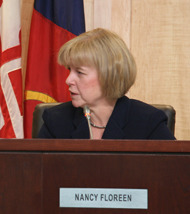E-Books and Libraries: Not So Fast!
The Montgomery County Council, which presides over my home jurisdiction and which includes my favorite person (my wife Nancy), is considering a resolution demanding that various state and federal government organs act immediately to ensure that the county’s library users have access to e-books in a “reasonable and non-discriminatory manner.”
The only problem with this resolution is that County residents already have exactly such access. What the resolution sponsors want is specially-advantaged access that discriminates against everyone else. I have submitted the following statement on this subject for the public record:
“Traditionally, the publishing industry, and writers, have subsidized the public library system, a system that is undeniably socialist. A single library book, which may generate $2 in revenue for a writer, can be loaned out dozens of times. At least some of those borrowers were likely to have purchased the book, but writers and publishers have been willing to forego that income because of their largely sentimental wish to support public libraries. Many writers have fond memories of libraries of their youths, where their love of the written word was nourished. Similarly, writers and publishers forego revenues altogether in the making of recorded books for the blind.
”E-books, however, raise special problems. A library book will eventually become too tattered to continue lending. If it is a popular volume, the library will buy another. That never happens with e-books. They never degrade. They are perpetual. That harms writers directly.
“Different publishers have taken different approaches to the problem of library distribution of e-books. Some simply refuse to sell e-books to libraries. Others charge premium prices for e-books. Others will license an e-book only for a specified number times it may be loaned out: for example, the license may expire after 26 times being loaned.
“These responses to the problem of library distribution of e-books are neither discriminatory nor wrong. They respond to a special problem presented by the lending of e-books for free. What other products in our world are given away for free? Does Microsoft give away its software? Does Exxon give away its gasoline? Does the library get its furniture for free?
“Moreover, with digitization, the economics of the publishing industry are in wild flux. Authors’ incomes are declining because authors earn less on e-books than on physical books. Other negative forces are the disappearance of retail outlets for books, not to mention the shrinkage and disappearance of book reviews in magazines and newspapers.
“Article 1, Section 8, clause 8 of the U.S. Constitution specifically provides for a system of copyright protection for the creations of authors because the Framers recognized that a vibrant political and civic culture requires that authors receive fair compensation for their work, and that the written word is uniquely vulnerable to being stolen. Books are the means for sharing the most important ideas of our time: in politics, in science, in history, in culture, and in the lives of our imaginations. If those who write books do not receive fair compensation — as is true in modern Russia and China, where book piracy is pandemic – the book culture will shrivel and die, leaving a nation that is poorer in ideas and understanding.”
Oh, and Nancy Floreen is NOT sponsoring this resolution, though she does dress up a blog post!

Nancy Floreen, Montgomery County Council




